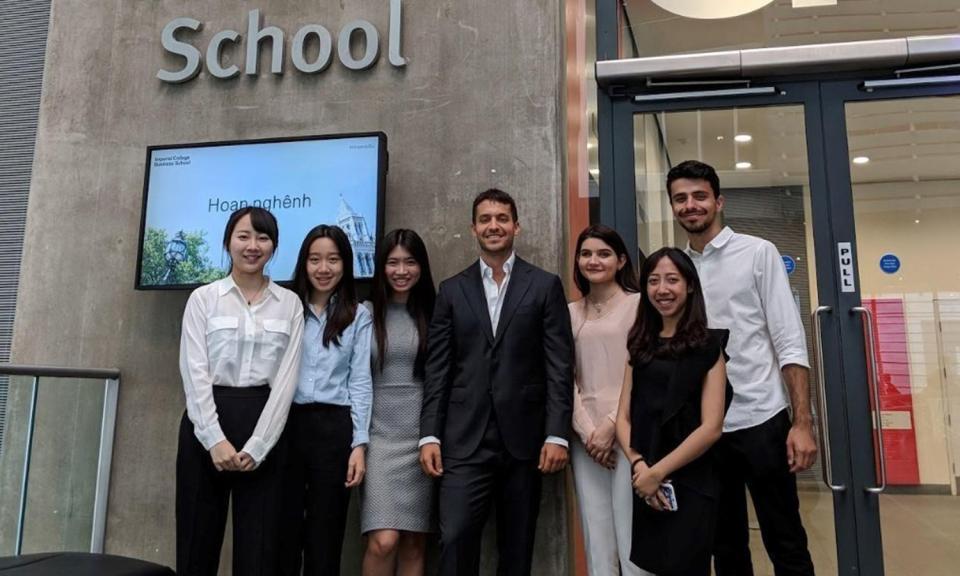
After returning to his home country post-graduation, Kyriakos Eleftheriou (MSc Management 2017) was frustrated with the difference in technological progress between London and Cyprus. He saw a unique opportunity to disrupt the market and decided to launch Cartaroo, the first online mall in Cyprus to provide same day delivery to the island.
What gave you the idea for your business?
A better future is a future of progress. It won’t happen if nothing changes, but it might happen tomorrow if things progress rapidly. Inventing new things can be considered as vertical progress. Improving things that work can be considered as horizontal progress.
Places like London and Silicon Valley are considered to be hubs of vertical progress - technological progress. Living in London gives you the opportunity to embrace new technologies every day, in everything you do. From fintech mobile payments, to food delivery networks. Greece or Cyprus are not yet quite at the same level of progress, with minimal e-commerce and no wireless payments for example.
After graduating from Imperial, I was back in Nicosia thinking: ‘Why do I still have to visit stores when I want to purchase anything?’, ‘How can I not know if a store has the product I want to purchase in a 4G connected world?’ And at the same time, ordering from Amazon or eBay would involve 10-30 day shipping.
I realised that minimal progress equals opportunity, with minimum threat of new entrants or the threat of substitutes. Moreover, starting a new startup in Athens or Nicosia, addressing a horizontal progress perspective, gave me a much better probability of long-term success, in comparison with well-known hubs.
Using the skills and knowledge gained at Imperial, I launched a minimum viable product to verify product market fit, and soon enough created Cartaroo, an e-commerce marketplace model, which facilities a network of stores, providing online ordering with same day deliveries across Cyprus.
I was privileged enough to study and learn from the best students worldwide, while connecting with a global network of experts who I contact on a daily basis. I consult with my fellow alumni for financial, strategic and entrepreneurial advice, plus insights into the multiple markets.
Greatest challenge in starting out
Most people in my cohort joined some of the best companies worldwide, such as Google and McKinsey. Having graduated as the top student across all pathways, I could have had similar chances in joining those firms. So on a personal level, I was potentially losing on a very rewarding corporate career path.
When we launched, we faced imminent challenges in value creation. There were issues – with the technology, the stakeholders, as well as marketing. This led to a constant fight with uncertainty and thus the high probability of failure was my greatest challenge.
Key lessons
-
Polished business plans are unimportant. Planning is mostly guessing.
-
Target market and culture understanding is very important. A conservative culture is very reluctant to change, and thus radical new ideas will have a hard time, so incremental advances may be ideal.
-
Ideas don’t matter. Execution matters.
-
Sales matter more than product. An unpolished product that sells is far superior to a polished that doesn’t. In fact, focusing on the lowest cost of acquisition at the beginning is ideal.
Advice to budding entrepreneurs
Entrepreneurship is uncertainty. In a world of uncertainty, the only certainty is that you are going to make major mistakes. Since good decisions come from experience, and experience comes from bad decisions, the fastest learner wins. There are two ways you can deal with that a) learn how to learn faster than anyone else and b) learn from people that been there. Isaac Newton said ‘stand on the shoulders of giants’ for a reason.
Think of things thoroughly by not relying on norms. Assuming no investment and no sustainable profits, the customer is not always right, data isn’t important, neither are business plans. By trying to satisfy the first customers, you lose the scope of growth. Data without scale can tell you very little. Instead of polishing business plans, spend the time on verifying the product market fit. They are massively important when you reach scale, or when you have a major investment, but you can’t rely on them before you have a stable core business that has sustainable profits.
Do things unconventionally. If you send a pitch deck to a VC in London, and they already receive 100 a day, what are the chances they see yours? If the average person sees 10,000 ads a day, what are the chances they recognise yours?
How did the Business School prepare you for setting up your own business?
It’s difficult to articulate how pivotal Imperial was in preparing me for the business world. Imperial is located in the heart of the London. Many distinguished CEOs and professors that spent their careers leading companies in technology, consulting and finance end up teaching at the School, and I learned both theoretical and practical knowledge, including cutting-edge technologies and innovations.
I was privileged enough to study and learn from the best students worldwide, while connecting with a global network of experts who I contact on a daily basis. I consult with my fellow alumni for financial, strategic and entrepreneurial advice, plus insights into the multiple markets.
The Business School also actively helped me on multiple occasions even after I graduated. We were lucky enough to collaborate with 6 impressive postgraduate students (pictured above), who consulted us for 3 months on growth marketing techniques. In addition, Imperial’s Enterprise Lab still provides me with business coaching even today.
